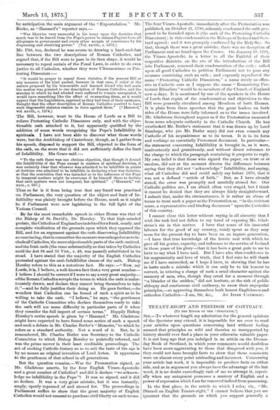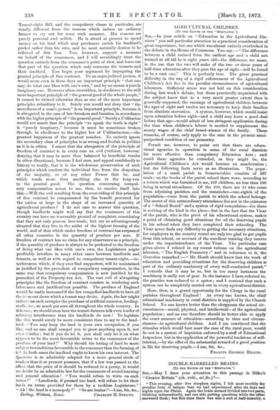TENANT-RIGHT AND FREEDOM OF CONTRACT.
[TO TEE EDITOR OT THE SPECTATOR.1
SIR,—To whatever length my admiration for the general opinions of the Spectator may extend, it is impossible for me ever to read your articles upon questions concerning land without feeling amazed that principles 60 wild and theories so unsupported by history should ever find a place in your otherwise valuable paper. It is not long ago that you indulged in an article on the Dooms- day Book of Scotland, in which your comments would doubtless have been more aggravating to those that disagreed with you, if they could not have brought facts to show that those comments were on almost every point misleading and incorrect. Concerning your article last week, it is impossible to produce facts on either side, and as in argument you always have the advantage of the last word, it is no doubt exceedingly rash of me to attempt it, especi- ally when my antagonist possesses a mastery of English and a power of expression which lam far removed indeed from possessing.
In the first place, in the article to which I refer, viz., "Mr. Disraeli on English Tenant-right," I cannot believe that you are ignorant that the grounds on which you support generally a
Tenant-right Bill, and the compulsory clause in particular, are totally different from the reasons which induce an ordinary farmer to cry out for some such measure. His reasons are purely personal and selfish. He is afraid at present to spend money on his land which may perchance enrich his landlord's pocket rather than his own, and he most naturally desires to be relieved of this fear. You, however, support a measure on behalf -of the consumers, and I will accordingly treat the question entirely from the consumer's point of view, and leave out that part of the question which only concerns the tenants and their landlord. You begin your argument by impugning the general principle of free contract. To an unprejudiced person, it would seem even in these days an important principle "that one may do what one likes with one's own," and by no means a purely imaginary one. However often overridden, in obedience to the still more important principle of "the general good of the whole people, it cannot be viewed otherwise than as one of the most important principles subsidiary to it. Surely you would not deny that "the sacredness of a man's person" is an important principle, because it is abrogated in the case of law-breakers and lunatics, in accordance with the higher principle of " the general good." Surely a Utilitarian would not assert that the principle "to speak the truth is right" is "purely imaginary," because it must be sometimes broken through, in obedience to the higher law of Utilitarianism,—the greatest happiness of the greatest number. To entirely ignore the secondary class of principles is as wrong and foolish in politics as it is in ethics. I assert that the abrogation of the principle of freedom of contract is in every case an evil (without, however, denying that it may be more than balanced by beneficial results in other directions), because I feel sure, and appeal confidently to history to testify, that it is the wholesome preservation of such principles which renders the individual free from the despotism of the majority, or of any other Power that be, and which tends more than anything else in the long-run to the general good. The question concerning compul- sory compensation seems to me, then, to resolve itself into this,—Will the evil resulting from the over-riding of this principle of free contract be compensated by the benefit procured for the nation at large in the shape of an increased quantity of agricultural produce ? I do not care to answer this question, though landlords might well say that the consumers of this country can have no reasonable ground of complaint, considering that they not only possess free-trade, but are so advantageously situated that they live in the midst of the highest farming of the world, and of that which under freedom of contract has surpassed all other countries in the quantity of produce per acre. If freedom of contract has no claim for any observance as a principle, if the quantity of produce is always to be preferred to the freedom of doing what one likes with one's own, the Legislature might profitably interfere in many other cases between landlords and tenants, as well as with regard to compulsory tenant-right,—in- terferences which, if they ever find supporters, will be maintained as justified by the precedent of compulsory compensation, in the same way that compulsory compensation is now justified by the precedent of the Property-tax Act. The vast evil of abrogating principles like the freedom of contract consists in rendering such inferences and justifications possible. The produce of England would be vastly increased if the law compelled landlords to have all the tres cut down which a tenant may desire. Again, the law might enforce on each occupier the purchase of artificial manures, feeding- stuffs, &e., so much per acre all throughout the whole country. In this case, we should soon hear the tenant-farmers talk even louder of arbitrary interference than the landlords do now ! To legislate like this would surely be more consistent than to say to the land- lord, "You may keep the land in your own occupation, if you like, and no one shall compel you to grow anything upon it, not even thistles ; but if you do let it, you shall only let it on what appears to be the most favourable terms to the consumers of the produce of your land !" Why should the letting of land be more subject to conditions favourable to the consumer than the farming of it ? In both cases the landlord ought to know his own interest. The Spectator is so admirably adapted for a more general circle of readers than it at present posseses, that if a law was passed to the effect that the price of it should be reduced to a penny, it would no doubt be an admirable law for the consumers of sound learning and general education ! "You would refuse to write on such terms?" "Landlords, if pressed too hard, will refuse to let their lands on terms provided for them by a reckless Legislature." " Ah ! the land is a monopoly !" "So are brains !"—I am, Sir, &c.,



































 Previous page
Previous page